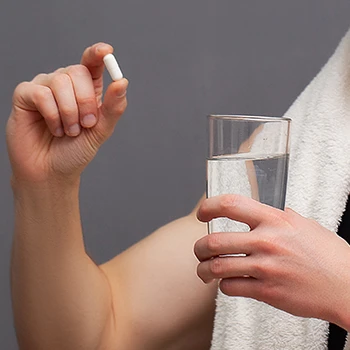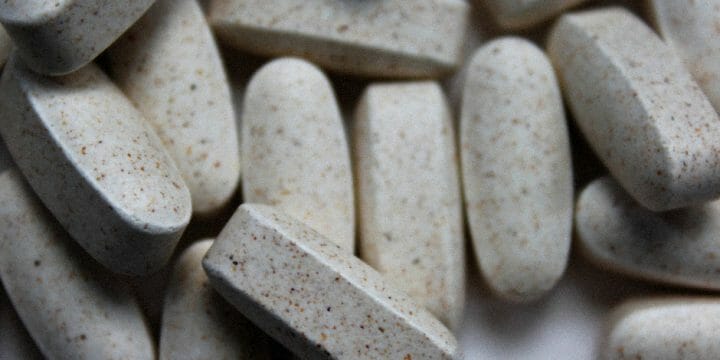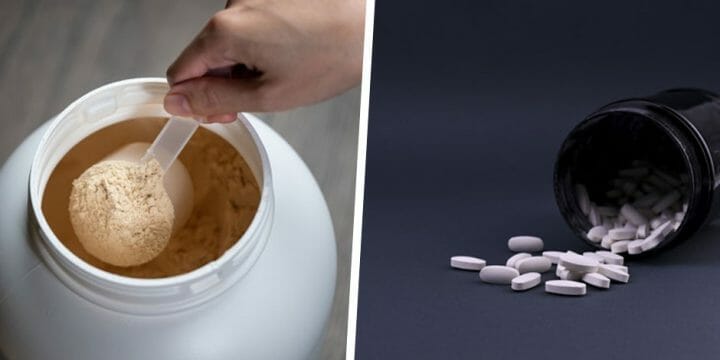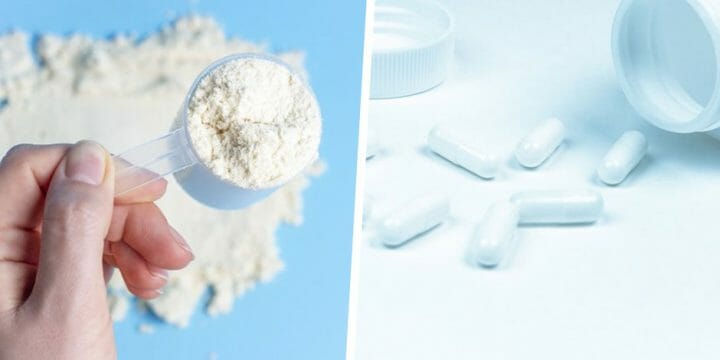As a personal trainer, my clients often ask me how much pre-workout they should take to boost their energy levels.
Because there is no one-size-fits-all pre-workout, my recommendations vary depending on the type of training, as well as the client at hand.
To give them the best advice possible, I spent a few days gathering available resources and researching the recommended dosages to increase power during training.
In addition, I spoke with my colleagues at Total Shape to gain insight into their experience and their knowledge of the sports industry standards. Read on to learn everything I found.
Quick Summary
Recommended Amounts for Pre-Workout

Every pre-workout mix in my cupboard has its own personality, just like the friends I hit the gym with. For instance, the one I use on leg days has a kick that gets me squatting more than I weigh.
I've played around with different amounts and found my perfect match. Below, I'm sharing a cheat sheet of ingredient dosages that I've not only researched but also tested during my own sweat sessions.
Caffeine
Genetic differences significantly impact caffeine metabolism, with variations in genes like CYP1A2 affecting the rate at which the body processes caffeine.
Slow metabolizers may experience prolonged caffeine effects, while fast metabolizers process it quickly. To determine pre-workout caffeine dosage, individuals should consider their genetic profile, aiming for optimal alertness without adverse side effects.
Caffeine is frequently used in sports drinks to increase exercise performance. 3 to 6 mg of caffeine per kg of body weight is typically considered safe for intake.
Therefore, according to 2019 study by the National Institute of health (NIH), a 50-kg individual may consume 150 to 300 mg of caffeine to accelerate his fitness journey [1].
Creatine
Creatine supplements are an excellent addition to ergogenic drinks because it is thought to improve agility, muscle growth, and post-workout muscle soreness.
According to research by the National Institute of Health, creatine supplementation in amounts of 0.1 g/kg of body weight has been shown to improve performance, suggesting that a 50 kg person should take around 5,000 mg of creatine to level up his gym sessions [2].
BCAAs
Branched-chain amino acids, or BCAAs, are frequently used in ergogenics to enhance muscle building and reduce delayed onset muscle soreness (DOMS).
Sports experts from WebMed recommend taking up to 20 grams of BCAA supplements in divided doses throughout the day to enhance athletic performance [3].
Beta-Alanine

Ever tried beta-alanine? The first time I did, I felt like I could run laps around the gym non-stop. It's like this little warrior in my pre-workout that fights off fatigue and keeps my muscles going strong. Trust me, it's a must-have for those long, grueling workouts.
A study from NIH showed that taking 4 to 6 grams of beta-alanine every day for four weeks helped improve physical performance [4].
Citrulline
L-citrulline is commonly used in ergogenic drinks to increase power and strength. It is also found in combination with malic acid to form citrulline malate.
Research from ScienceDirect shows that the general advice for L-citrulline is 3 to 4 grams, while the recommendation for citrulline malate is 8 grams [5].
These recommended amounts should help athletes reach optimal performance.
Tyrosine
Tyrosine is commonly added to sports drinks to enhance power and endurance. According to research, experts usually advise taking 150 mg of tyrosine daily.
However, as per Drugs.Com, most supplement manufacturers recommend between 500 mg and 1,500 mg for maximizing its benefits on physical performance [6].
Betaine
Betaine is another common ingredient in ergogenic drinks. It aids in bodybuilding by hydrating muscle cells, giving the muscles more power to pump those weights.
It has been demonstrated in a study by NIH that taking 2.5 to 5 grams of betaine safely and effectively improves exercise performance [7].
Bioavailability of Ingredients
The bioavailability of pre-workout ingredients plays a crucial role in determining their effectiveness, as it influences how much of the substance is absorbed and utilized by the body.
- Caffeine: Caffeine is rapidly absorbed, usually within 30-60 minutes, making it an effective energy booster. Optimal dosage varies but typically ranges from 200-400mg. Slow metabolizers may require lower doses to prevent side effects.
- Creatine: Creatine's bioavailability is high, and it's commonly consumed in doses of 3-5g to increase muscle energy and strength.
- Amino Acids: Amino acids like citrulline and beta-alanine can have lower bioavailability. Citrulline malate, for instance, may require a dosage of 6-8g to enhance nitric oxide production for improved blood flow and endurance.
- Vitamins/Minerals: These micronutrients typically have high bioavailability, and recommended daily intake should suffice unless there's a deficiency.
To optimize absorption and effects, consider timing (e.g., taking caffeine 30 minutes before exercise), synergistic combinations (e.g., caffeine with L-theanine for focus), and individual response.
Adjusting dosages based on bioavailability ensures you get the most out of your pre-workout supplements while minimizing potential side effects. Consulting a healthcare professional or nutritionist for personalized guidance can be beneficial.
How Do You Know if You're Taking Enough Pre-Workout?
You'll know if you're taking enough pre-workout by noticing how your body responds to the supplement 30 to 45 minutes after taking it without food.
"If you’re going to use pre-workout, use it the way it’s supposed to be used."
- Kate Patton, MEd, Registered Dietician
When it comes to knowing how much caffeine you've consumed, you'll know you've had enough if you have the drive and focus needed to improve your workout performance.
If nothing seems to have changed, the amount may be too small for you. If, on the other hand, you feel more jittery than usual, the dosage may have been too high.
What Are the Downsides of Taking Too Much or Too Little?

The downsides of taking pre-workout too much or too little will depend on an individual’s sensitivities, intolerances, and fitness goals.
When you take too little, your performance won't improve as much as you thought it would, and you'll have wasted the money you spent on it.
On the other hand, if you take too much, you may experience negative pre-workout side effects such as irregular heartbeats, stomach upset, and headaches.
FAQs
Is It Good to Take Pre-Workout Supplements Every Day?
In general, it is good to take pre-workout supplements every day. However, you need to make sure you're taking the right amount based on your fitness goals and personal preferences.
Also, since they’re not regulated by the Food and Drug Administration (FDA), it is best to take those that only have safe, natural ingredients.
How Much Pre-Workout Should You Take for the First Time?
For the first time, you should take half a scoop of pre-workout to assess your tolerance and sensitivity to other ingredients like caffeine.
If you think you can tolerate the amount and can handle more to maximize the benefits, you can increase your intake to one scoop or to the recommended amount.
References:
- https://www.ncbi.nlm.nih.gov/pmc/articles/PMC6548757/
- https://www.ncbi.nlm.nih.gov/pmc/articles/PMC3407788/
- https://www.webmd.com/diet/health-benefits-bcaas
- https://www.ncbi.nlm.nih.gov/pmc/articles/PMC4501114/
- https://www.sciencedirect.com/science/article/pii/S2095254620300168
- https://www.drugs.com/npp/tyrosine.html
- https://www.ncbi.nlm.nih.gov/pmc/articles/PMC3844502/
About The Author
You May Also Like






